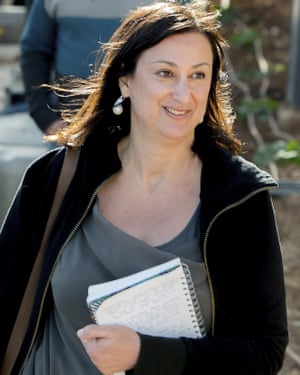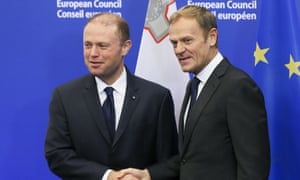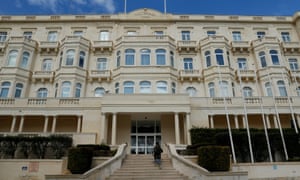When Ali Sadr, the son of one of Iran’s richest men, got married in a lavish ceremony at the Four Seasons hotel in Florence in June 2015, the guest list included VIPs from around the world.
Among the notable attendees were Joseph Muscat, the prime minister of Malta, his wife, Michelle, and chief of staff, Keith Schembri.
There were reasons to celebrate. Despite his lack of experience and his ties to Iran – which might have raised red flags in some western jurisdictions – Sadr had recently won a licence to open a private bank in Malta.
Pilatus bank was not only catering to wealthy clients from all over the world, it was in discussions to get involved in a scheme that Muscat had promised would transform Malta’s “prehistoric economy” – the sale of Maltese passports to rich foreign investors.
Nearly three years after the Tuscan wedding, the landscape has changed.
Sadr, 38, is sitting in a New York prison awaiting trial on charges of laundering money and busting sanctions, having been arrested at Dulles airport in Washington DC last month.
Muscat, who has decisively won two elections in Malta, is facing serious questions, including from the European parliament, about whether the island has become a rogue state at the heart of the EU.
Government critics paint a picture of a democracy in decline, a slow erosion that came into sharp focus when the investigative journalist Daphne Caruana Galizia was murdered by a car bomb last year.

While three suspects have been charged, and a magistrate is hearing the police case against them, the motive behind the crime remains unknown.
Muscat, a former journalist who has said he was outraged by the murder, was only 39 when he swept to power in 2013 on a promise to eradicate corruption, end parochialism and lower energy costs.
Young and charismatic, Muscat had been touted in Brussels as a potential successor to Donald Tusk, the president of the European council.
While still popular at home, his hopes of securing high office in Europe appear to be in tatters.

Muscat faces accusations of failing to take action against two officials in his inner circle: Schembri, who is the subject of two magistrates’ investigations, and Konrad Mizzi, the tourism minister, whose business dealings have been scrutinised by the island’s anti-money laundering authority.
Both men have repeatedly denied any wrongdoing and no charges have been brought.
Following Sadr’s arrest, the focus has turned to Muscat’s ties to the man behind Pilatus bank.
Muscat has acknowledged that he has met Sadr “a number of times” and described his attendance at Sadr’s wedding as an “unexceptional event”.
“I know Mr Sadr as I would know any person who invests in Malta and meet a number of times,” the prime minister said.
Q&A What is the Daphne Project?
A fearless anti-corruption journalist, Daphne Caruana Galizia’s reporting came to international attention with her exposes in the 2016 Panama Papers project.
On 16 October the following year, the Maltese reporter was murdered by a bomb placed under the driver’s seat of her car.
The Daphne Project was created to continue her investigations. It is a collaboration of 18 media organisations in 15 different countries, including the Guardian, Reuters, Le Monde and the New York Times.
The project is the first to be led by Forbidden Stories, an international network of journalists who stand ready to take over when colleagues are silenced through imprisonment or murder.
The project will publish a series of fresh revelations, setting out the dangers that alleged political corruption and poor controls on money laundering inside Malta pose to law and order in Europe.
The Guardian understands Sadr first entered Muscat’s orbit in October 2013, when the pair were introduced at an event in London by Christian Kälin, the chief executive of Henley & Partners. The event marked the launch of a new passport-selling scheme that Kälin and Henley were establishing in Malta.
Under the terms of the government’s deal with Henley, wealthy foreign investors could legally buy Maltese citizenship in exchange for hundreds of thousands of euros in investment.
Muscat or a member of his staff had the job of promoting the passport scheme at events hosted by Henley in places such as Dubai, Monaco and Lebanon.
Sadr was an important customer of Henley’s, having legitimately purchased four passports for himself a few years earlier from Saint Kitts and Nevis, where Henley had also established a passport-buying scheme.
The Iranian national used the St Kitts passport when he applied for his banking licence in Malta.
His background raised enough concern to prompt Maltese officials to hire an outside firm to conduct due diligence on his application. The extra care was necessary, coming months after the US Treasury had warned that certain individuals who were acquiring St Kitts passports were seeking to engage in illicit financial activity.
The application was eventually approved.
Four years on, and that decision is bound to be scrutinised.
Sadr was arrested by US authorities in March, following a five-year criminal investigation.
Weeks before this, the Malta Financial Services Authority, an anti-corruption unit, began an investigation into Pilatus, including an examination of whether the bank had been involved in wrongdoing.
The MFSA seized the bank and froze its accounts in March, a few days after Sadr’s arrest was announced by the US Department of Justice.
Sadr was charged in a six-count indictment for allegedly participating in a scheme to illegally funnel $115m (£82m) in payments from Venezuela to Iranian individuals, in violation of US sanctions and anti-money laundering rules. He was denied bail. Sadr has denied wrongdoing.
While Pilatus is not named in the indictment, one person close to the regulatory review in Malta said the legal action against the bank’s owner could lead to Pilatus being wound down, as banks in similar circumstances have been in other jurisdictions. Pilatus has €126.9m in assets – about half the amount it had in December 2016.

The Guardian has been told Pilatus’s financial information is in the hands of the US Treasury’s financial crimes unit, FinCen. The European Banking Authority has also opened an inquiry into the bank.
It is not suggested Muscat knew anything about any potential wrondgoing at Pilatus.
He defended himself against accusations that he had been too slow to act against members of his government, saying there were continuing independent investigations into alleged wrongdoing and he would act if any claims were proven.
“An important element of the rule of law is the principle of innocent until proven guilty. We are in a world today where misinformation, gossip and speculation have become potent forces in society,” Muscat said. “In Malta, I am determined that proper process and rule of law should prevail.”
But questions about Malta’s record under his leadership are growing louder.
David Casa, a Maltese MEP and member of the opposition Nationalist party, said: “Corruption has been institutionalised. Our democratic institutions have been weakened by design.”
Last year, in a rare public rebuke, a business leader at the Maltese chamber of commerce questioned the government’s commitment to the rule of law, and suggested investment might stop flowing into the country amid growing concern. Muscat shrugged off the criticism.
“Investment does not come to corrupt countries,” he said. “Investment goes to countries where there is rule of law … That is why investment is coming to Malta.”